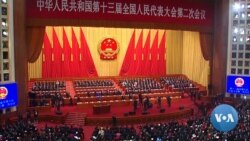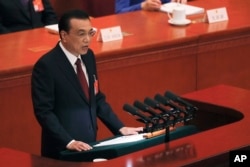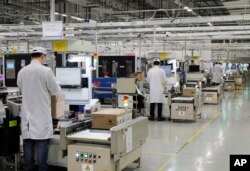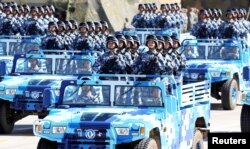China’s Premier Li Keqiang has warned that the world’s second largest economy has a tough struggle ahead this year as Beijing grapples with slowing growth and an ongoing trade dispute with the United States.
In his annual address to China’s National People’s Congress – the country’s largely rubberstamp legislature – the premier told some 3000 delegates that Beijing expects growth to continue this year in a range between six and six-point five percent this year. That range, while enviable in most countries, will actually continue to be the slowest growth that China has seen in 30 years.
Economic challenges ahead
“As we pursue development this year, we will face a graver and more complicated environment as well as risks and challenges, foreseeable and otherwise, that are greater in number and size. We must be fully prepared for a tough struggle,” Li said.
Li voiced confidence that China’s communist leadership could guide the country through the storm, but the tone of his speech was sober.
He mentioned the phrase “stabilize” or “stability” more than 70 times, highlighting things such as the need to stabilize the stock market, financial sector, unemployment, expectations, foreign and domestic investment and of course, trade frictions with the United States.
It is not the first time in recent weeks that the communist party’s leadership has been talking about stability and the risks China now faces. In one recent internal speech, China’s President Xi Jinping cautioned about the possibility of a color revolution, notes China expert Willy Lam.
“The administration is afraid that if they do not take enough action to prevent massive social upheaval, then, the stability of the country, and particularly, the viability of the Communist Party, the legitimacy of the party might be challenged,” Lam said.
Lam said that given the poor performance of manufacturing, exports and other consumption factors, unemployment is probably much worse than expected.
Government taking some steps to help
Since late last year, the party has been stepping up efforts to support companies and keep unemployment figures down. In December, the government unveiled plans to provide Chinese graduates with internship opportunities and support for companies that did not lay off employees.
“They [Chinese authorities] are aware that China’s economy will inevitably see a slowdown. However, they hope that its pace can be gradual. In other words, a hard landing should be avoided. Shall a hard landing occur, their regime [political authority] will be challenged,” said economist Darson Chiu.
In his speech or government work report, Li announced plans to cut company taxes and social insurance contributions by nearly $300 billion and to lift public spending and make fiscal policy more forceful.
China, US searching for 'common economic ground'
Trade tensions and tariffs are adding to the challenges Beijing is facing. Washington’s extradition request for tech giant Huawei’s chief financial officer and concerns about the company and its links to China’s authoritarian government are all part of that complicated environment.
Still, officials in the U.S. and China are optimistic the two sides can reach a deal. Secretary of State Mike Pompeo said Monday that he is hopeful that in the coming days and weeks, there will be what he called a significant announcement.
Speaking on the sidelines of Beijing’s annual political meetings, China’s Commerce Minister Zhong Shan said the two countries still need to find some common ground.
“At present, working teams are still continuing negotiations, as we still have a lot to do. Even more, we need China and the United States to meet half way and work together," Zhong said.
China is expected to pass its first Foreign Investment Law during meetings of the National People’s Congress this year. A step that Beijing is taking to bridge that gap. However, analysts and observers will be watching to see what other steps the legislative body takes to shore up support for private enterprises or to further open up China’s economy.
China’s military spending will be lower than last year, but still looms large analysts note, especially since the actual figure is much larger than what is publicly disclosed. Li said Beijing will increase its military spending by 7.5 percent this year, that’s around $180 billion. That amount is about three times more than what India spends, but still much less than the United States’ military budget. Last year, Washington spent almost $700 billion on defense.








